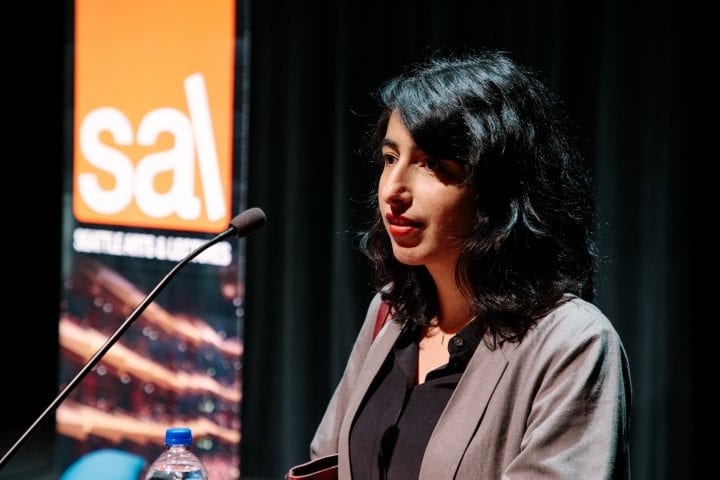
Introductions: Solmaz Sharif
June 7, 2019
On June 3, 2019, we had the pleasure of welcoming poet Solmaz Sharif to the SAL stage—or rather, re-welcoming, as her initially-scheduled appearance in February was cancelled due to one of the worst Seattle snowstorms in years. SAL Associate Director Rebecca Hoogs gave this introduction to start the evening, and, after Sharif’s reading, the poet was joined for a Q&A with local writer Lena Khalaf Tuffaha.
By Rebecca Hoogs, SAL Associate Director
Solmaz Sharif is the author of the stunning collection, LOOK, which was long-listed for the 2016 National Book Award for Poetry and made nearly every best-of list for that year and will, I believe, be named one of the most important books of this decade.
In it, she cracks open the Department of Defense Dictionary of Military and Associated Terms, an ice-cold snowstorm of American euphemisms which shuts down the city of feeling, of empathy, of understanding. Her work clears the way, salts the roadways and what we’re left with isn’t beautiful—it’s messy and raw and melting.
But in this way, she also cracks us open. Her poems make us look. Look at the way language is a living organism, an evolving beast, but also a tool–in the hands of those that make the dictionaries, of those that order the drone strikes–of suppression and oppression.
The New York Times Book Review praised the collection, saying “LOOK is at once a command to see and to grieve the people these words describe—and also a means of implicating the reader in the violence delivered upon these people… An artful lexicographer, Sharif shows us that the diameter of a word is often as devastating as the diameter of a bomb.”
Sharif’s poems are like the “stopped wristwatches” she includes in a piece early in the book—time capsules of a moment when life or language is stilled, or seems to still. When the little hand of the person meets the big hand of the government. The language of American war is made to distance the most intimate things while poetry, the best poetry, the poetry you are about to hear tonight, is made to make intimate things both intimate and distant. Is made to start stopped things, to stir our ticking hearts, even if it hurts. And it does. It will.
In an essay that Lena Khalaf Tuffaha wrote for Poetry Northwest on Sharif’s book, she said, “This is a book of poems of and for us, the War-on-Terror Era readers. We, citizens of a nation endlessly at war, are re-awakened to the legacy of our language by Sharif’s work.”
When I write or read poetry, I do so because it makes me feel more alive and more awake. It doesn’t always make me feel happier—in fact, I often feel more despair, more pain, more terror the more I look at this world. But feeling more alive is worth it. The poet and poems you will hear tonight do just this work—they enliven language, they shine a light on the dark parts, and, for better or worse, they wake us up. We are more alive together in the world, in the words, of this writer.